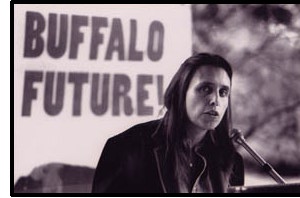 |

|
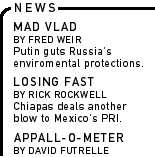
|
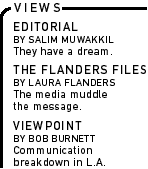
|
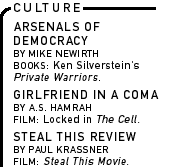
|
| |
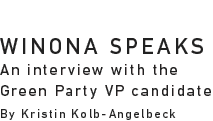 |
|
|
While Al Gore and George W. Bush were coming down from their convention-infomercial highs, Ralph Nader and his running mate, Winona LaDuke, were barnstorming their way across the country and gaining the attention of independent-minded voters. On August 25, a Portland, Oregon rally for the Green Party ticket drew more than 10,000 people--larger than any public event for Bush or Gore this year. Nader may be a familiar name. But who's Winona LaDuke? The 40-year-old economist, writer and mother of three is also a leading voice for American Indian rights. She lives with her family in White Earth, an Anishinaabeg reservation in northern Minnesota, where she heads the White Earth Land Recovery Project. LaDuke also co-chairs the Indigenous Women's Network and acts as program director for Honor the Earth, a national American Indian foundation. In These Times' News Editor Kristin Kolb-Angelbeck caught up with LaDuke before she left for Portland, during a pit-stop at her White Earth home.
What does your campaign offer to voters dissatisfied with Gore and Bush? Ralph and I are saying: Let's cut to the quick of the dilemma we are facing in this society, which is the concentration of power and wealth in the hands of a few and the growing disenfranchisement of the vast majority of the American people. Al Gore
Most job growth in the past few years has been in temp jobs and low-wage jobs. More people are working at places like Wal-Mart for minimum wage. All those people "happily" moving off welfare may be employed, but they still are living at or below poverty level. Bush and Gore do not speak to these people.
What do you want to bring to the national political agenda? First and foremost, we need to move the budget out of a military economy. A third of the federal budget is spent on the military right now--10 times what we spend on education. I have two children in school and one of them had class in a trailer all last year. But instead of education, they spend money on new missile systems. We need to transform this military economy into a peacetime economy. That transformation would drive not only economic and social justice, but it would also do a lot for the environment. The military is the single largest toxic producer in the country. We also need to talk about demilitarizing our foreign policy. We're the single largest purveyor of small weapons in the world. Today most of the conflicts around the world are not fought with ICBMs or F-16s, they're fought with small guns--if that's what you want to call an M-16. During World War I, 95 percent of the people killed were combatants. Today 90 percent of people killed in wars are women and children. You do not sell guns to people who violate human rights, who are going to use those guns to mow down women and children. You don't give them guns with my tax dollars.
Do you think Bush would do more harm to your community than Gore? Actually, Republican presidents have not been that bad for Indians. They've returned more land. Nixon was the best president for Indian people, isn't that interesting? He gave back more land and he supported more legislation benefiting Indian people than any other president of the past 30 years. Indians are suing the federal government for mismanagement of Indian funds. It's the largest class-action lawsuit in history. Now why do we have to sue them? Why couldn't they just say, "We're going to fix it." Meanwhile, the Republicans say they will tidy that up right away: It's on the Republican Indian platform.
What's on your Indian platform? Oh, I've got a big Indian platform. Invest in an alternative energy policy. One of my big things is that the Great Plains is considered the "Saudi Arabia of wind power." We need heavy investment there. Plains tribes have all the potential in the world for wind energy, but they don't have any money. Meanwhile, 65 percent of research and development money in the Department of Energy over the past 40 years has gone to nuclear power and coal. Wouldn't it be great if we spent it researching and developing wind and solar power? Also, set a living wage. Offer economic justice for poor communities. Create economic enterprise zones based on a localized model. Begin reconciliation and restitution programs similar to what [slave reparations advocate] Randall Robinson talks about. Basically, good countries should honor their treaties and good countries should not steal.
What are the biggest obstacles facing your campaign? One is lack of access to the public forum, especially the debates, and the other is fear. The vast majority of the American electorate that is progressive bases their [political] decisions on fear, not on principle, and that's a shame. They're like, "Oh no, I can't vote for him, this might happen." We've got to get past that.
Is there really no difference for you between Gore and Bush? I lost one of my best friends last year because of Al Gore. Her name was Ingrid Washinawatok, and she was killed in Colombia in March 1999. She went down there to help the U'wa [fight Occidental Petroleum's plans to drill on their ancestral land] and was assassinated by the FARC. Meanwhile, Gore has $500,000 worth of Occidental stock and the U.S. government just gave $1.3 billion in military aid to Colombia. They are the second largest recipient of U.S. military aid, and basically it's used to blow away civilians. What Bill Clinton and Al Gore do is insidious. They let Occidental executives stay in the Lincoln Bedroom, and then they give military aid to Colombia to help support their little oil developments down there. I cannot support that man. I didn't even vote until 1996. If I didn't have Ralph to vote for, I wouldn't vote.
Why didn't you vote? Because I just didn't believe in it. I wanted to vote for what I believe in. Also because of my circumstances--a lot of Indian people don't vote because they consider the United States a foreign government.
Do you think more American Indians are going to vote in this election? Yes. We have the lowest voter turnout of anybody. If I can convince another 5 to 10 percent to vote, I'll feel really great. Did you know there are 600,000 Indian voters in Oklahoma? And there are 60,000 in Montana. Indians would be a pivotal voting group if we would get out and vote.
What do you think of the media coverage of your campaign? All anybody really knows about you is that you're a Native American woman and you're running with Ralph Nader. That illustrates how trivialized our campaign is. What do they say about Dick Cheney? They don't just say he's a rich white guy. In my case, I got a degree [in economics] from Harvard; I got a master's in world development from Antioch. I'm a rural economist by training. I wrote a couple of books. I wrote a novel [Last Standing Woman]. I have spent most of my life working on energy policy issues for different Indian communities who are being dammed or flooded or radiated or torn up for utilities in the East. I'm also the only candidate whose annual income is under six digits.
Looking at the protests against the WTO and the IMF, what do you see as a positive economic alternative to globalization? Localization--investing in local economies. Remember the rise of the microbreweries a few years ago? We need to return to micro-cheeseries, small farms. We need to value local markets. The government needs to finance small businesses and stop corporate mergers. I lost track after AOL bought Time Warner. It's like a woman with 19 hyphenated last names. I have no idea who's who anymore. Keep your own names, ladies. You can't just exist on your island of political correctness. You have to fight bad guys and make good. Strengthen your communities. And you've got to vote. [Baby cries.] I have three children. I have a six-month-old here that I'm nursing.
How do you juggle campaigning and being a mom? Wildly. I always bring the baby with me when I'm travelling. I really had to trade in my family [to do this campaign]. So I try to demand family time as much as I can. I also realize that to ensure a good life for my kids, I have to retain my political activism. To be honest with you, as a woman, campaigning strikes me as a male privilege. Guys can walk away from childcare. All those politicians have someone else take care of their kids. But I'd rather be with my kids than out shaking hands.
As a woman and a mother, how do you see yourself bringing a different perspective to politics? I see the back end of all the laws the Washington guys write. Living in a poor community, as a woman and as a mother, I feel the absence of good education programming, of funding for daycare and health programs for kids. Every four years, I see these guys talking about what to do with women's bodies. But you don't hear them talking about the quality of women's lives in between campaigns. I think I bring a much more holistic perspective. If you care about
the quality of life for future generations, you better care about
the quality of life for women and children. And that better mean
clean air, clean water, good health care, good education. That's
your future. Your future is not in how many guns you have. Your
future is in the well-being of your kids.
|

